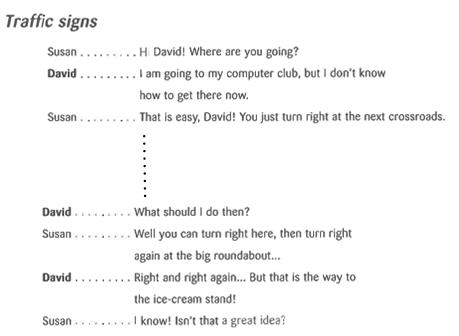Esl Conversation Dialogues For Beginners
- English Conversation Dialogues For Beginners
- Esl Dialogues For Adults Pdf
- Easy English Conversation For Beginners
5 Clever Conversation Lesson Plans for Adult ESL Students 1. Talking Jobs. This conversation lesson is exceptional for your beginner adult students. It implements key vocabulary that is easy to follow while discussing the target topics of work, jobs, likes and dislikes. Easy English Conversations: English Conversations: Easy Conversations. English for Students. Home; Confused Words. You do not want to be an English professor or a professional translator (Well, if you want to be, please skip this article immediately) so do not worry about 100% correct grammar. It is acceptable for the beginner to say.
Amy: What have you been pulled over 1 for? Curtis: I’ve been pulled over for tailgating 2 an ambulance. Amy: Oh, my God. I didn’t think that was the story he was going to pick. Curtis: No, this is a very, very bad thing to do. I don’t recommend you doing this. What’s tailgating?
Curtis: Tailgating is following somebody too close. So usually you have to leave a car length in between the car in front of you and your car. And I at that point Amy: Had a very, very bad habit of driving way too close. Curtis: Right. And in between–or I was in between the emergency ambulance vehicle in front of me and a police car behind me. But I didn’t know it was a police car because it didn’t have the lights. Amy: Oh, it was a ghost car 3.

Curtis: It was a ghost car. Amy: Sneaky 4. Curtis: Or an unmarked car. An unmarked car. Curtis: And right away, he turned on his lights that were on his dashboard and the front of his car and his siren. And he was mad. Curtis: But I got lucky 5 on that one too.


Even though he was mad, he didn’t give me a ticket. Sometimes they let you off. They–like they let you off the hook 6 or I don’t know. They give you, what is it? Curtis: A warning 7 Amy: Yeah, they give you a warning. Don’t do it again. It’s a written warning.
And it goes on record that you’ve been warned about this. But they don’t actually give you a fine. Curtis: Yeah. He kept track of it for sure. Phrase Explanations: • Pulled over: Stopped by the police • Tailgating: Driving very closely to the vehicle in front of you • Ghost car: A police car with no lights or markings. Also known as an unmarked car. • Sneaky: Doing something in a secret, unfair or not obvious way • I got lucky: To have good luck unexpectedly • Let you off the hook: When you get caught doing something wrong or illegal and you don’t get punished for it.
‘Let you off’ is the short way of expressing this. • Warning: An official notice that you have been warned not to do something again The full of lesson of ‘Driving’ is available when you join as a Free Member! Listen to Smith’s Experience Here My name is Smith and I am from Haiti. I am really happy to have signed up for Real English Conversations because it has really helped me improve my listening and speaking skills.
English Conversation Dialogues For Beginners
And thanks to the teacher, Amy Whitney, who also acts as a researcher on how to learn a foreign language more efficiently. So, thanks to her good advice and methodology about how to deeply work out my listening and how to stick with my speaking practice, even without having someone to talk to, I have been able to gradually improve my English in many ways. About the Teachers on Real English Conversations Curtis and I (Amy) are from Canada in North America. We have a passion for traveling and teaching real English to help students improve their communication skills. Learning a language as an adult is challenging.
Esl Dialogues For Adults Pdf
I have first hand experience learning a second language to fluency. After taking vacations in several countries in Central and South America, we decided to follow our dreams and move to another country. Now, we live in Mexico. Even after moving to this country, I realized that living here and breathing in the Mexican air was not helping my Spanish skills. After all, I work from home teaching online and I don’t spend the entire day speaking to people.
Easy English Conversation For Beginners
The truth is that improving a language takes practice, consistency and a desire to improve. In our, I teach students effective ways to practice English to improve speaking and listening skills using the techniques and unique methods I have discovered or created. The same methods that helped me reach fluency and maintain my current conversation abilities my new language, even though, I don’t have much time to practice.